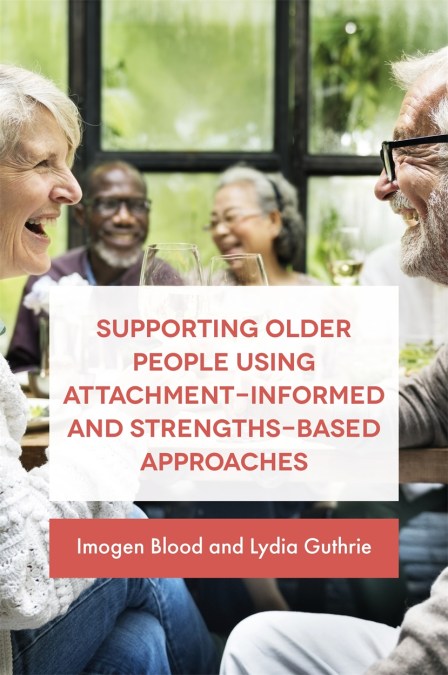We have updated our Privacy Policy Please take a moment to review it. By continuing to use this site, you agree to the terms of our updated Privacy Policy.
Supporting Older People Using Attachment-Informed and Strengths-Based Approaches
On sale
19th July 2018
Price: £22.99
The significance of attachment theory for working with older people has been overlooked, and yet its importance is clear – evident in the experiences of people who struggle to adapt to new ways of living, to life with limiting health conditions, or to new social networks.
This book explains how an understanding of attachment theory can empower health and social care staff, and improve the care of older people. It also serves as an accessible introduction to strengths-based working, covering principles and practice as well as key practice issues such as positive risk-taking, supporting people with dementia, working in end of life settings and working with whole families.
With in-depth case studies depicting a broad span of experiences and easy to use tools for practice, this practical guide serves as an essential guide for all staff supporting older adults.
This hands-on guide will help frontline workers convert this policy vision into practice.
This book explains how an understanding of attachment theory can empower health and social care staff, and improve the care of older people. It also serves as an accessible introduction to strengths-based working, covering principles and practice as well as key practice issues such as positive risk-taking, supporting people with dementia, working in end of life settings and working with whole families.
With in-depth case studies depicting a broad span of experiences and easy to use tools for practice, this practical guide serves as an essential guide for all staff supporting older adults.
This hands-on guide will help frontline workers convert this policy vision into practice.
Newsletter Signup
By clicking ‘Sign Up,’ I acknowledge that I have read and agree to Hachette Book Group’s Privacy Policy and Terms of Use
Reviews
Applying attachment theory to close relationships in later life is still a neglected topic (I say that with some experience because it was the subject of my PhD, and it was just as neglected then). This book goes a long way to stress the importance of recognising that attachment processes carry on until the end of life, when the loss of key attachment figures is more and more frequent. By introducing 'strength-based' and other contemporary ideas closely connected with attachment theory and research the authors have produced a very relevant and readable volume for practitioners from all disciplines.
This book is an essential read for practitioners, supervisors, researchers and educators concerned with working with older adults. Attachment theory is about all of us, across the whole of our lives. Imogen Blood and Lydia Guthrie have written a richly rewarding and comprehensive volume, providing profound and useful insights and ideas for working systemically, holistically and humanely with older people.
This is a really important and timely book. It's essential that we inject the humanity back into our caring relationships, formal and informal. Too much attention is given to the architecture of care; rules regulations, protocols. Too little is done to support carers and care workers to foster the essential and deeply human relationships we'd like to see. Far to little understanding and recognition about how we as humans can be best engaged to bring our empathy, humanity and kindness to the fore. Blood and Guthrie draw on solid evidence to demonstrate why we have to change our culture around care, it's not about 'them' it's about all of 'us'. If we want care to be kind we have to make the system around it kind. Until we fully recognise the relational and human aspect to care we will continue to fail to create the conditions for kind of care we want for our loved ones and indeed ourselves. Bravo!

